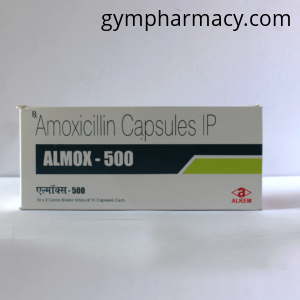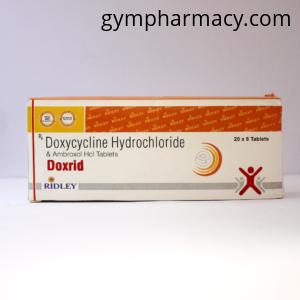INJECTION OF MIKACIN 250 MG
INJECTION OF MIKACIN 250 MG Belonging to the aminoglycosides class of antibiotics, which are used to treat bacterial infections. Bacteria are single-celled microbes that can infect any part of the human body. The proliferation/multiplication of dangerous bacteria strains inside or on the body is referred to as bacterial infection.
Bacteria that are either infectious or dangerous can make you sick and proliferate swiftly in your body. Toxins are produced by these hazardous bacteria, which can damage tissue and make you sick. MIKACIN 250 MG INJECTION inhibits the formation of bacterial proteins, which are required for the bacteria’s survival. The bacterial cell dies as a result of this.
A healthcare expert will provide MIKACIN 250 MG INJECTION. Do not self-medicate. MIKACIN 250 MG INJECTION dosage is determined on your medical state and the severity of the infection. It’s also a good idea to finish the course of treatment even if you feel better since it’s an antibiotic, and skipping it might lead to a more serious illness that won’t react to the antibiotic (antibiotic resistance). Certain typical adverse effects, such as discomfort at the application site, skin rash, nausea, and vomiting, may occur in certain circumstances. The majority of these adverse effects do not necessitate medical treatment and will subside with time. However, if you are experiencing these adverse effects on a regular basis, you should consult your doctor.
Even if you have symptomatic alleviation, finish the full course of MIKACIN 250 MG INJECTION to effectively treat your disease. If you have any problems while using MIKACIN 250 MG INJECTION, don’t hesitate to talk to your doctor. Before and during treatment, your doctor may urge you to have urine, blood, and hearing tests to look for symptoms of adverse effects. Your doctor may alter the dose of MIKACIN 250 MG INJECTION 2ML based on the findings of these tests. It is recommended that you stay hydrated before and during your MIKACIN 250 MG INJECTION 2ML therapy.
MIKACIN 250 MG INJECTION CAN BE USED FOR: Infections caused by bacteria

Medicinal Advantages
MIKACIN 250 MG INJECTION is an antibiotic that belongs to the aminoglycoside class of drugs. MIKACIN 250 MG INJECTION is a prescription antibiotic that is used to treat severe bacterial infections caused by bacteria that are resistant to MIKACIN 250 MG INJECTION 2ML. MIKACIN 250 MG INJECTION inhibits the formation of bacterial proteins, which are required for the bacteria’s survival. Bacteria will die as a result of this.
Use Instructions
A healthcare professional will give AMIKACIN. Do not self-medicate. AMIKACIN is usually given as an injection into a muscle. However, it can also be administered as an injection or an infusion into a vein (drip). During surgery, AMIKACIN can also be injected into the abdominal cavity (peritoneum) and used to clean up the lung cavities, brain cavities, and abscess cavities. It is recommended that you stay hydrated before and during your AMIKACIN therapy.
Storage
Store in a cool, dry location away from direct sunlight.
AMIKACIN Side Effects
AMIKACIN, like many drugs, can produce adverse effects, though not everyone gets them. AMIKACIN’s most common adverse effects are irritation at the application site, skin rash, nausea, diarrhoea, and vomiting. If you encounter any of these adverse effects on a regular basis, contact your doctor right once.
Precautions and Warnings in Depth
If you have an allergy to AMIKACIN, antibiotics containing aminoglycosides, sulphites, or if you have myasthenia gravis (severe muscular weakness in the body), you should avoid using it. If you have any kidney or hearing issues, such as tinnitus, see your doctor before using AMIKACIN (buzzing or ringing in the ears). Because AMIKACIN might induce dizziness, it is not recommended that you drive or operate heavy machinery after taking it. Before using AMIKACIN, consult your doctor if you are pregnant or breastfeeding. Only if the benefits exceed the dangers will your doctor prescribe AMIKACIN.
Interactions Between Drugs
INTERACTIONS WITH OTHER MEDICATIONS: AMIKACIN may interact with diuretics (furosemide, ethacrynic acid), pain relievers (indomethacin, aspirin, lidocaine), antibiotics (penicillin, kanamycin, gentamycin, ceftriaxone, vancomycin), vitamin supplements (thiamine), and anti-cancer medications (like cisplatin).
FOOD-DRUG INTERACTIONS: AMIKACIN has no known food interactions.
INTERACTIONS WITH DRUGS AND DISEASES: AMIKACIN may interact with dehydration, neuromuscular blockade (blocking of neuromuscular transmission at the junction), ototoxicity (ear toxicity/failure), and renal dysfunction (kidney problems).
Safety Suggestions
ALCOHOL
It is not recommended that you drink alcohol while taking AMIKACIN since it may cause negative side effects.
PREGNANCY
D is the pregnancy category. Before using AMIKACIN, consult your doctor if you are pregnant. Only if the benefits exceed the dangers will your doctor prescribe AMIKACIN.
BREAST FEEDING
Before using Amikacin, see your doctor if you are beast-feeding. Only if the benefits exceed the dangers will your doctor prescribe AMIKACIN.
DRIVING
Because AMIKACIN might make you dizzy, you should only drive or use machinery if you are fully attentive.
LIVER
If recommended by a doctor, AMIKACIN is considered safe.
KIDNEY
In individuals with renal problems, AMIKACIN should be administered with care. In such cases, a dose change may be required.
No habit formation
Advice on Diet and Lifestyle
Antibiotics have the potential to change the beneficial bacteria in the stomach that aid digestion. As a result, foods high in probiotics, such as yogurt/curd, kefir, sauerkraut, tempeh, kimchi, miso, kombucha, buttermilk, natto, and cheese, are recommended.
Whole grains, beans, lentils, berries, broccoli, peas, and bananas are all high in fiber.
Calcium-rich meals, grapefruit, and grapefruit juice should be avoided since they may interfere with antibiotic absorption.
To properly cure your disease, avoid consuming alcohol.
Tobacco should be avoided.
Even if you have symptomatic alleviation, finish the entire course of AMIKACIN to effectively heal your disease.
Recommendations
Even if you have symptomatic alleviation, finish the entire course of AMIKACIN to effectively heal your disease.
If you have any problems while taking AMIKACIN, don’t hesitate to talk to your doctor.
It is recommended that you stay hydrated before and during your Amikacin therapy.
Because AMIKACIN might induce dizziness, exercise caution when driving or using heavy machinery.
If you are pregnant, breastfeeding, or trying to become pregnant, talk to your doctor before using AMIKACIN.
Additional Information : This item is non-refundable.
Concerns of Patients
Bacterial infections are caused by the growth/multiplication of dangerous bacteria inside or on the body. There are bacteria that are beneficial and bacteria that are dangerous. Beneficial microorganisms aid digestion and immunity. The pathogenic bacteria that cause illnesses are known as harmful bacteria. Fever, weariness, headache, nausea, vomiting, and enlarged lymph nodes in the neck, armpits, and groin are all common indications and symptoms of bacterial infections.
FAQs
AMIKACIN is an antibiotic that belongs to the aminoglycoside class of drugs. AMIKACIN is a prescription antibiotic that is used to treat severe bacterial infections. AMIKACIN acts by preventing the development of bacterial proteins that are required for the bacteria’s survival. Bacteria will die as a result of this.
Yes, AMIKACIN can affect your renal function. Blood and urine tests will be recommended by your doctor to determine the amounts of protein, white/red blood cells, and creatinine or nitrogen in blood samples. In individuals with renal problems, AMIKACIN should be administered with care. In such cases, a dose change may be required.
AMIKACIN is only intended for short-term use. Your doctor will determine how long you should take MIKACIN 250 MG based on the severity of the illness and your overall health. AMIKACIN is usually recommended for a maximum of 10 days. Even if you have symptomatic alleviation, finish the full course of AMIKACIN to effectively heal your disease.
AMIKACIN might make you dizzy. It is not recommended that you drive or operate heavy machinery after taking AMIKACIN since it might induce dizziness and eye problems. Only drive or operate machinery if you are fully awake.
Antibiotics have the potential to induce diarrhea. Probiotic-rich foods, such as yogurt, cheese, and buttermilk, should be included in your diet to aid digestion. Consume high-fiber foods such as whole grains, beans, peas, and bananas. If you experience severe diarrhea, see your doctor. Without contacting your doctor, do not use any anti-diarrhea medication.









Leave a Reply
You must be logged in to post a comment.